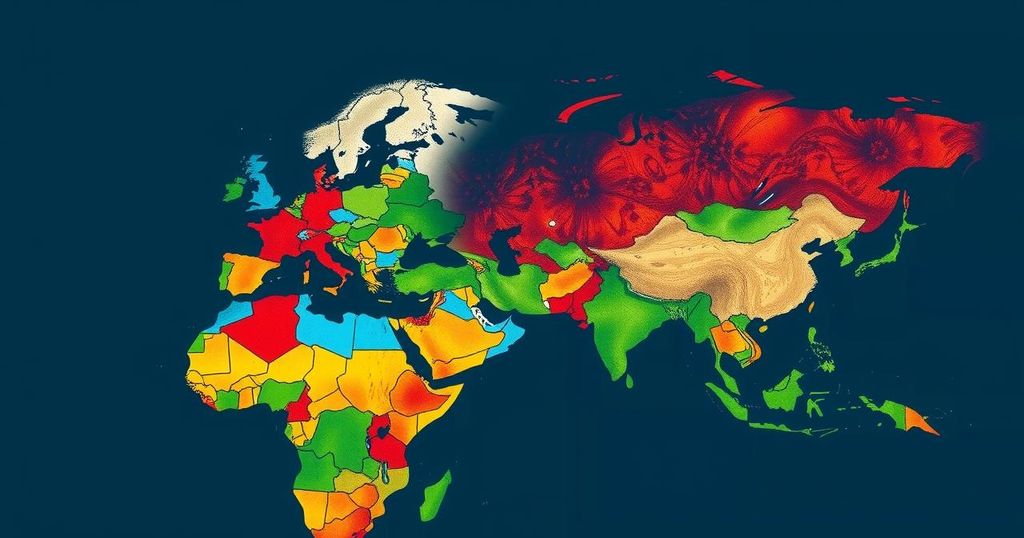At the International Court of Justice, representatives from vulnerable nations, including Vanuatu, argue that a limited number of historically large emitters should be held legally responsible for climate change impacts, emphasizing the urgent need for accountability in light of ongoing environmental degradation faced by Pacific island nations. The proceedings involve testimonies from 98 countries, seeking to clarify obligations regarding greenhouse gas emissions and their legal ramifications.
In a significant legal discourse at the International Court of Justice (ICJ), representatives from vulnerable nations have urged that a small number of countries bear legal accountability for the ongoing climate crisis. Vanuatu’s special envoy for climate change, Ralph Regenvanu, articulated that these nations have historically produced vast amounts of greenhouse gases yet are least affected by the resulting environmental consequences. He asserted, “We find ourselves on the frontlines of a crisis we did not create.” As Pacific island nations, such as Vanuatu, face escalating challenges from rising sea levels and severe weather events, the urgency for accountability has intensified.
This pivotal hearing is the culmination of extensive advocacy by Pacific Island legal scholars and diplomatic efforts led by Vanuatu. In March of the prior year, the UN General Assembly unanimously endorsed a resolution requesting an advisory opinion from the ICJ regarding nations’ obligations to combat climate change and the potential legal consequences of inadequate action. Over two weeks, representatives from 98 nations will present their statements, including historically responsible emitters and those minimally contributing to greenhouse gas emissions, such as states from Bangladesh and Sudan. Notably, the largest emitters, the United States and China, will also address the court despite not fully recognizing its authority.
As proceedings unfold, Regenvanu highlighted alarming statistics illustrating a troubling trend in emissions, which have surged over 50% since 1990, despite scientific warnings. The ICJ plans to release detailed statements from participants, including personal accounts from individuals directly affected by climate change. Legal counsel Ilan Kiloe emphasized the existential threat faced by many Pacific cultures, asserting, “The harsh reality is that many of our peoples will not survive.”
Margaretha Wewerinke-Singh, representing Vanuatu and the Melanesian Spearhead Group, asserted that some states have violated international laws, particularly through their engagement in fossil fuel exploitation and inadequate regulation of harmful emissions. She called for these states to provide full reparations proportionate to their historical contributions to climate harm. Cynthia Houniuhi, president of a youth organization advocating for climate justice, lamented that the Paris Agreement’s hopeful potential has been undermined by fossil fuel interests.
The ICJ is among three international courts tasked with delivering advisory opinions on climate issues, alongside the International Tribunal for the Law of the Sea (ITLOS) and the Inter-American Court of Human Rights. ITLOS has already established that greenhouse gases qualify as pollutants, underscoring states’ legal responsibility to mitigate emissions. The ICJ is expected to utilize these earlier opinions, along with precedents from other judicial entities, to inform its conclusions, noting that its advisory opinions, while influential, are not binding.
The proceedings commenced with an opening ceremony in The Hague featuring political addresses and cultural performances by artists from the Pacific Islands. As Houniuhi poignantly articulated, the repercussions of climate change represent an existential threat to her people and future generations. She stated, “As judges, you possess the power to course-correct and renew hope in humanity’s ability to address the greatest challenge of our time. And you do this simply by applying international law to the conduct responsible for climate change.”
The climate crisis represents an urgent global challenge disproportionately affecting vulnerable nations, particularly island states facing existential threats from rising seas and increased climatic disasters. This legal representation at the ICJ underscores long-standing grievances held by these nations against major greenhouse gas emitters that historically contribute to the climate emergency. This hearing is framed within a broader context of international law, advocacy for climate justice, and a call for the global community to acknowledge and rectify inequalities stemming from historical emissions, as addressed by recent United Nations resolutions and advisory opinions from other international judicial bodies.
The ICJ hearings reflect growing calls for accountability among major carbon emitters for their role in the climate crisis. As vulnerable nations like Vanuatu bear the immediate impacts, the dialogues at the court emphasize the need for legal recognition of climate responsibilities. The outcomes sought by the representatives aim to shift global frameworks towards equity and reparations, thereby establishing a foundation for future climate agreements that genuinely address the rights and survival of impacted communities.
Original Source: www.theguardian.com






